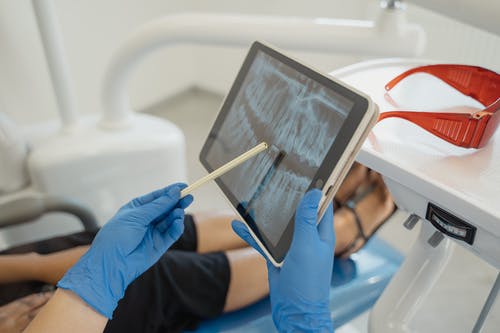If you’ve found yourself missing a few pearly whites due to accident, age, or dental problems, you might be exploring your options to restore that perfect smile. One popular solution is the dental implant procedure. But what, exactly, are dental implants, and what can you expect throughout the procedure?
Defining Dental Implants
Dental implants are prosthetic tooth roots surgically implanted into the jawbone to provide a stable and durable foundation for replacement teeth. Dental implants in Ewing, NJ are typically made of biocompatible materials like titanium and are designed to fuse with the jawbone through osseointegration.
Key characteristics and components of dental implants include:
- Implant Body: This is the main part of the implant, typically shaped like a small screw or cylinder. It is surgically placed into the jawbone and is the artificial tooth root.
- Abutment: The abutment is a connector piece that attaches to the implant body. It protrudes above the gumline and provides a secure anchor for the replacement tooth (crown), bridge, or denture.
- Crown, Bridge, or Denture: These are the visible, custom-made prosthetic teeth attached to the abutment. Crowns are used for single-tooth replacement, while bridges or dentures can be supported by multiple implants to replace several teeth or an entire arch.
Benefits of Dental Implants
Dental implants offer a range of significant advantages, making them a popular and highly effective solution for individuals with missing teeth or those seeking a long-term and permanent tooth replacement option. Here’s a closer look at these benefits:
- Natural Appearance: Dental implants are designed to mimic natural teeth’ appearance closely. The custom-made crowns, bridges, or dentures attached to the implants are carefully crafted to match the color, size, and shape of your existing teeth, creating a seamless and natural-looking smile. This aesthetic enhancement can boost your self-confidence and improve your overall appearance.
- Improved Stability: Dental implants provide exceptional stability, unlike removable dentures, which can sometimes shift or slip during eating or speaking. They are anchored securely within the jawbone through osseointegration, ensuring replacement teeth remain firmly in place. This stability allows for confident chewing and speaking without concerns about dentures moving out of position.
- Preservation of Surrounding Teeth: Dental implants are a standalone tooth replacement solution. They do not rely on neighboring teeth for support. This means adjacent healthy teeth are not altered or compromised, as is often with dental bridges. Dental implants promote better long-term oral health by preserving the integrity of your existing teeth.
- Enhanced Comfort: Dental implants become a natural part of your oral anatomy, eliminating any discomfort or irritation associated with removable dentures or bridges. There are no bulky appliances or adhesives, making daily activities like eating and speaking more comfortable and enjoyable.
- Long-Term Durability: Dental implants can last a lifetime with proper care and maintenance. They are incredibly durable and resistant to decay. This long-term durability can make them a cost-effective choice over the time, as they eliminate frequent replacements or adjustments that may be necessary with other tooth replacement options.
- Bone Health and Facial Structure Preservation: Dental implants play a vital role in preserving jawbone health. They stimulate bone growth and prevent the bone loss that typically occurs when teeth are missing. This preservation of bone density helps maintain the natural shape of your face and prevents a sunken or aged appearance that can occur with significant bone loss.
- Versatility: Dental implants can replace a single missing tooth, multiple teeth, or even an entire arch of teeth. They can be customized to meet each patient’s unique needs, making them suitable for various tooth loss scenarios.
The Dental Implant Procedure
1. Initial Consultation
Your journey towards a renewed smile starts with an initial consultation. During this appointment, your dentist will examine your entire mouth and jaw, taking X-rays to check your bone health. This step is critical as a healthy jawbone is crucial for the success of the dental implant.
2. Preparation and Planning
Based on your oral condition, the dentist would plan your treatment process, which may include prerequisite procedures like bone grafting or removal of remaining tooth structure. Every case is unique and requires customized treatment planning.
3. Implant Placement
Placement of the implant into your jawbone is the next step. This surgical procedure involves making an incision in your gum to expose the bone for implant insertion. Despite sounding intimidating, rest assured that you’ll be properly anesthetized.
4. Osseointegration
Osseointegration refers to the fusion of the implant with your jawbone—a process that typically spans a few months. During this time, it’s crucial to maintain good oral hygiene to avoid any complications.
5. Abutment and Crown Placement
Following successful osseointegration, the dentist will place an abutment or connector post on the implant. The crown resembles your natural tooth and is attached to the abutment, completing your dental implant.
Delving Into Dental Veneers
Though dental implants are durable for missing teeth, some people might want something less invasive or a fix for less severe dental issues. Enter dental veneers—a cosmetic procedure that addresses tooth discoloration, slight misalignment, or chips and cracks.
Veneers are thin shells, either made of porcelain or resin composite materials, that are custom-made to cover the front surface of your teeth. When you seek professional care for veneers in Pennington, you can expect a dramatic change in the color, shape, size, or length of your teeth, rejuvenating your overall smile.
Choosing the Right Dentist
Choosing the right dental provider is crucial when opting for a dental procedure. Specialists in creating dental implants or veneers, known as prosthodontists, are highly skilled in their field. Meanwhile, Pennington dentists specializing in family and implant dentistry are accustomed to treating patients of all ages, from young children to seniors. A family and implant dentist can provide preventative education, treatments, and therapeutic procedures such as implants and veneers, making them a versatile choice for dental care.
Conclusion
Whether it’s dental implants or veneers, such procedures require careful consideration and planning. Knowing what to expect during the procedure could help you eliminate fears and provide reassurance. We hope you now understand what you can expect from a dental implant procedure and how dental veneers and the right choice of dentist can contribute toward achieving your perfect smile.



